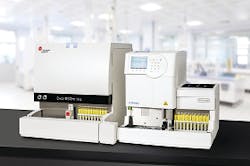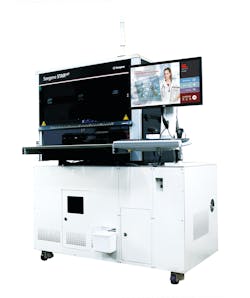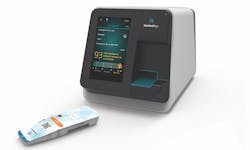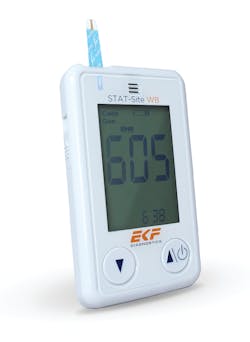Many vendors showcased new products during the American Association for Clinical Chemistry’s (AACC) Annual Scientific Meeting & Clinical Lab Expo, which was held in Atlanta September 26-30.The staff members at Medical Laboratory Observer describe some of those products below.
Beckman Coulter launched its urinalysis analyzer
Beckman Coulter launched a urinalysis analyzer at the 2021 AACC Annual Scientific Meeting & Clinical Lab Expo.
A routine urinalysis is one the most frequently ordered tests, representing up to 30% of all samples received in the lab, the company said. Given the volume, “the most important thing is to minimize disruptions in the workflow,” explained Matthew Rhyner, PhD, MBA, Vice President and General Manager of Urinalysis at Beckman Coulter. However, that is typically not the case in urinalysis because lab technicians often perform manual inspections of samples, which causes the process to take up to six times longer than would be the case with an automated system.
To solve that problem, the DxU Iris Workcell allows urinalysis operators to automatically classify sediment particles, minimizing the need for manual inspections.
The DxU Iris Workcell pairs the DxU 850m Iris or DxU 840m Iris urine microscopy analyzer with the Arkray AUTION MAX 4030 urine chemistry analyzer to create a scalable, fully automated urinalysis solution. The workcell was developed with proprietary Digital Flow Morphology technology with Auto-Particle Recognition (APR) Software, which enables laboratories to deliver standardized results using artificial intelligence (AI).
The analyzer integrates with Beckman Coulter’s informatics software solutions: PROService remote service tool, DxONE Command Central remote monitoring, and REMISOL Advance middleware.
“We have taken what people like about the iQ (Series Urinalysis Workcell) and added a lot of enhancements,” Rhyner said.
Seegene launched an automated MDx system
Seegene demonstrated a fully automated PCR testing (MDx) system at the 2021 AACC Annual Scientific Meeting & Clinical Lab Expo.
AIOS is composed of independent and detachable modules together with the company’s proprietary SW architecture. AIOS is designed with an extraction/liquid handler and PCR instrument integrated with an in-house developed robotic arm module. Hospitals and laboratories can either purchase the full package of the ‘AIOS’ system or integrate their existing instruments on-site if they already have Seegene’s liquid handler and real-time PCR instrument.
The system can run a variety of Seegene’s syndromic assays that are currently available in the market, allowing for symptom-based testing.
FDA clears test to distinguish between bacterial and viral infections
MeMed, based in Haifa, Israel, said the U.S. Food and Drug Administration (FDA) has granted 510(k) clearance for use of an assay and testing platform to help healthcare providers distinguish between bacterial and viral infections.
The company showcased the product during the conference.
The technology, which has been cleared for both children and adults, is called MeMed MV. It runs on the MeMed Key platform, which the company describes as a “point of need,” or point of care, device.
Bacterial and viral infections are often clinically indistinguishable, leading to the prescription of antibiotics for the treatment of viral infections, for which they are ineffective. Antibiotic misuse drives the emergence of antimicrobial resistance (AMR).
MeMed’s technology decodes the body’s immune response to infection, the ‘host response,’ rather than focusing on detecting the presence of a microbe. The company says that this allows for diagnosis even when the infection site is inaccessible or unknown, when the pathogen is undetectable using conventional tests, or when the causes of infection are emerging new pathogens.
FDA clearance was based on a multi-center blinded clinical validation study enrolling over 1,000 children and adults and addresses goals laid out in the U.S. National Action Plan for Combating Antibiotic Resistant Bacteria. The test provides highly accurate results with Area Under the Curve of 90% and 97% (primary and secondary endpoints).
MeMed has established its U.S. base in Boston and is ramping up commercial activities.
EFK launched, demonstrated products at AACC
EKF Diagnostics recently launched a STAT-Site WB dual analyte measurement system, which it demonstrated at AACC.
The new handheld analyzer measures B-ketone and glucose from whole blood in seconds. EKF also introduced its newest hemoglobin analyzer for the U.S. market, the Hemo Control, which provides near patient hemoglobin and hematocrit results in one test as quickly as 25 seconds.
At AACC, the company also highlighted the Lucica Glycated Albumin-L, manufactured by Asahi Kasei Pharma. It is a specific test for glycated albumin (“GA”) and is cleared for sale in the U.S., where it is sold exclusively by EKF Diagnostics. The established test enables intermediate term glycemic monitoring of diabetics over the preceding 2-3 weeks.
Thermo Fisher showcased range of products
Thermo Fisher Scientific launched a range of products during AACC’s 2021 meeting.
To support ongoing COVID-19 testing, Thermo Fisher launched two new PCR-based kits, the Applied Biosystems TaqPath COVID-19 Fast PCR Combo Kit 2.0 and the Applied Biosystems TaqPath COVID-19 RNase P Combo Kit 2.0.
The kits target eight genes across three regions of the virus that causes COVID-19. Additionally, the company announced that the Mu variant is now included in its existing Applied Biosystems TaqMan SARS-CoV-2 Mutation Panel.
Thermo Fisher also launched the new Thermo Scientific AcroMetrix SARS-CoV-2 Control for monitoring extraction, amplification and detection steps for SARS-CoV-2 assays.
In addition to COVID-19 testing, the company also demonstrated a new Fentanyl assay, DRI Fentanyl II, for labs involved in drug screening. The U.S. Food and Drug Administration recently granted the product 510(k) approval.
Thermo Fisher Scientific also partnered with Mindray to provide two new high-performance analyzers, the Mindray BS480 and Mindray BA800M. These new analyzers and an expanding assay portfolio equip labs with the flexibility to run up to 800 tests per hour, the company said.
In the area of autoimmune diseases, Thermo Fisher showcased the EliA SmDP-S test. Cleared by the U.S. Food & Drug Administration (FDA), it aids in the diagnosis of Systemic Lupus Erythematosus (SLE), the most common type of lupus.
20/20 GeneSystems launched lab product incubator
20/20 GeneSystems launched a business incubator for clinical lab products. Called Clinical Lab Innovation Axcellerator (CLIAx), the company said it believes the facility is the first shared CLIA laboratory facility geared to helping diagnostic test innovators worldwide substantially reduce the time and cost of launching their tests in the U.S.
“Establishing and maintaining a compliant CLIA lab can be costly and daunting for young companies, especially those seeking to enter the American market from overseas,” 20/20 President and CEO, Jonathan Cohen said. “Our unique CLIA Axcellerator removes or lowers many of the barriers in the path of these innovators.”
CLIAx has nearly 3,000 square feet of ready-to-use communal clinical laboratory space and testing equipment, including a full PCR/molecular assay suite, NextGen Sequencing (NGS), immunoassay, and clinical chemistry capabilities. Importantly, 20/20’s marketing and sales teams will help promote the new tests introduced by CLIAx’s clients to the market segments in which 20/20 is currently active.
Earlier this month the company signed an agreement with Australian-based Minomic International, a diagnostics firm that is gearing up to introduce MiCheck Prostate, a blood test that uses proprietary algorithms and biomarkers to estimate the risk of aggressive prostate cancer.
CLIAx was officially designated by the Maryland Department of Commerce as a “Soft Landing” program for overseas companies seeking to enter the U.S. market. “Maryland is ‘open’ for international companies looking to expand, and the new Clinical Laboratory Innovation Axcellerator will provide the perfect soft landing for those seeking to explore the U.S. market,” said Maryland Commerce Secretary Kelly M. Schulz.
20/20 GeneSystems, based in Rockville, MD, offers OneTest, a blood test to aid in the early detection of multiple cancers, as well as several COVID-19 testing solutions including viral tests based on PCR and point-of-care, rapid antibody and antigen tests.





